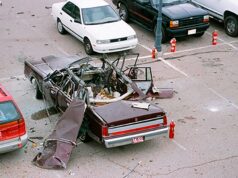Car accidents are more than just a moment of collision; they rip through the lives of those involved, often leaving a trail of unseen and intangible impacts. Statistics reveal a startling reality: in the year 2020, roughly 4.7 million accidents involved passenger cars, altering not just metal and glass but also the course of their lives.
Amid this turmoil, understanding non-economic damages becomes crucial for victims. These damages, often overshadowed by their economic counterparts, speak to the profound personal losses experienced.
Seeking guidance from knowledgeable sources, like the car accident lawyers at the Flood Law Firm, becomes essential in navigating these often complex and deeply personal claims. Their expertise shines a light on the often misunderstood aspects of post-accident recovery, offering a beacon of hope and clarity for those grappling with the aftermath of an accident.
What Are Non-Economic Damages?
Non-economic damages refer to the intangible losses victims suffer after a car accident, distinct from the tangible monetary costs covered under economic damages. These damages, unlike their economic counterparts, do not have a direct financial value and are more subjective.
They encompass a range of personal impacts, such as pain and suffering, emotional distress, and the loss of enjoyment in life. These types of damages recognize the profound, often invisible, toll that an accident can take on an individual’s well-being and daily life.
Pain And Suffering
Pain and suffering encompass the physical discomfort and emotional turmoil a victim endures following a car accident. This broad category can include the immediate physical pain from injuries, chronic discomfort during recovery, and the psychological strain of dealing with trauma.
Calculating pain and suffering in a lawsuit is complex, as it involves assessing the severity of the injury, the duration of pain, and the impact on the victim’s lifestyle. Lawyers often use specialized formulas or rely on precedents to quantify these subjective experiences into a compensable figure.
Emotional Distress
This refers to the psychological impact suffered by victims—a facet of trauma that often goes unseen. This distress can manifest in various forms:
- Anxiety: Persistent worry or fear that disrupts daily life.
- Depression: Pervasive feelings of sadness, hopelessness, or loss of interest.
- PTSD (Post-Traumatic Stress Disorder): Intense, disturbing thoughts and feelings related to the accident that linger long after the event.
Proving emotional distress in court requires substantiating the psychological impact through medical records, expert testimony, and personal accounts, demonstrating how the accident directly caused these emotional challenges.
Loss Of Enjoyment Of Life
This is the diminished ability to experience and partake in activities and pleasures that one valued before the accident. This non-economic damage acknowledges how injuries can transform a victim’s daily life, restricting their participation in hobbies, social activities, or simple joys like a morning jog.
Loss Of Consortium
Loss of consortium is a unique non-economic damage, focusing on the impact of a car accident on the victim’s relationships, particularly with their spouse or family members. This loss encompasses the deprivation of love, companionship, comfort, and sexual relations, reflecting the strain accidents place on personal bonds.
Legally, proving loss of consortium is challenging as it requires tangible evidence of a substantial change in the relationship dynamics. Documentation and testimonies often play a crucial role in illustrating these intimate losses in court.
How To Claim Non-Economic Damages
After a car accident, claiming non-economic damages begins with immediate action: document everything, seek medical attention, and record your experiences and emotional state. Engaging a legal representative is crucial; they navigate the complex process, advocate on your behalf, and quantify intangible losses.
Essential documentation includes:
- Medical records
- Psychological evaluations
- Personal diaries
- Witness statements
This evidence, combined with legal expertise, strengthens your claim, helping to secure compensation that genuinely reflects your non-economic losses.
Challenges In Proving Non-Economic Damages
Proving non-economic damages is challenging due to their subjective nature. Unlike economic damages, they lack a clear monetary value. Expert testimony becomes pivotal in these cases, providing professional insights into the victim’s suffering and validating their claims. Strategies to strengthen a claim include:
- Maintaining detailed personal records of emotional and physical distress.
- Gathering comprehensive medical and psychological reports.
- Securing affidavits from family, friends, or colleagues who can attest to the impact on the victim’s life.
Final Word
Understanding and rightfully claiming non-economic damages is vital for car accident victims, acknowledging the full extent of their ordeal. It’s not just about financial compensation but recognizing the more profound personal toll of the accident.
Victims are encouraged to seek professional legal advice to navigate these complex claims, ensuring they receive the comprehensive support and compensation they deserve for their unseen yet deeply felt losses.














